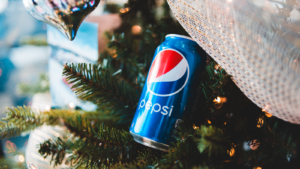Key Takeaways
- Zero Calories: Diet Pepsi offers a zero-calorie alternative to regular cola, appealing to those managing caloric intake without sacrificing taste.
- Artificial Sweeteners: It uses artificial sweeteners like aspartame and sucralose for sweetness, providing flavor without sugar and associated calories.
- Lacks Nutrients: Diet Pepsi does not provide essential vitamins or minerals, serving primarily as a refreshing beverage rather than a nutritional source.
- Weight Management Considerations: While it may aid in weight management by substituting high-calorie drinks, individual responses to artificial sweeteners can vary, potentially affecting cravings.
- Health Risks: Some studies raise concerns about the long-term effects of artificial sweeteners on metabolic health, making it important to consume in moderation.
- Comparison with Other Drinks: Diet Pepsi contains fewer calories than regular Pepsi and compares similarly with other diet sodas, allowing consumers to choose based on flavor preference and caffeine content.
In a world where health and wellness take center stage, many people are turning to low-calorie alternatives like Diet Pepsi. This popular beverage promises the refreshing taste of cola without the added sugar and calories found in its regular counterpart. But what exactly does Diet Pepsi offer in terms of nutrition?
This popular beverage promises the refreshing taste of cola without the added sugar and calories found in its regular counterpart. But what exactly does Diet Pepsi offer in terms of nutrition?
Understanding the nutritional profile of Diet Pepsi can help consumers make informed choices about their beverage options. With its unique blend of artificial sweeteners and other ingredients, it’s crucial to explore how this drink fits into a balanced diet. Dive into the specifics of Diet Pepsi nutrition and discover what it means for those looking to enjoy a fizzy treat without the guilt.
Diet Pepsi Nutrition
Diet Pepsi, a low-calorie soft drink, offers a distinct alternative to regular cola. Diet Pepsi contains no calories, making it appealing for those monitoring calorie intake. Instead of sugar, it uses artificial sweeteners like aspartame and/or sucralose to deliver sweetness without the calories.
The primary ingredients in Diet Pepsi include carbonated water, caramel color, phosphoric acid, caffeine, citric acid, and natural flavors. Each serving typically contains around 35 milligrams of caffeine, which provides a mild stimulant effect. The sodium content is approximately 40 milligrams per serving, which contributes to its flavor profile.
Nutritionally, Diet Pepsi does not offer vitamins or minerals but provides refreshment without added sugars or significant calories. This makes it a popular choice among those seeking a carbonated beverage that fits into a calorie-conscious lifestyle. Although Diet Pepsi contains no nutrients, it serves as a satisfying option for individuals who enjoy fizzy drinks without the guilt associated with high-calorie alternatives.
Nutritional Components of Diet Pepsi
Diet Pepsi offers a distinct nutritional profile that is vital for consumers interested in low-calorie beverage options. Understanding the specific components helps make informed dietary choices.
Caloric Content
Diet Pepsi contains zero calories per 12-ounce serving. This makes it a popular choice for those managing caloric intake. By consuming Diet Pepsi instead of regular cola, individuals significantly reduce their daily caloric consumption without sacrificing the enjoyment of a fizzy drink.
Sugar and Sweeteners
Diet Pepsi contains no sugar, utilizing artificial sweeteners such as aspartame and sucralose for sweetness. These sweeteners provide the flavor profile typically associated with sugar but without the associated calories. Aspartame contributes approximately 4 calories per gram, yet the quantity used in Diet Pepsi results in an overall calorie count of zero per serving.
Vitamins and Minerals
Diet Pepsi does not contain vitamins or minerals. Each serving is calorie-free, sugar-free, and lacks essential nutrients. While it provides refreshment and flavor, Diet Pepsi is not a significant source of nutritional benefits or dietary supplementation. It serves primarily as a carbonated beverage for those seeking a guilt-free option.
Health Considerations
Diet Pepsi offers an option for individuals pursuing a low-calorie beverage, but it’s essential to weigh its health considerations. Awareness of its impact on weight management and potential health risks helps consumers make informed choices.
Impact on Weight Management
Diet Pepsi contains zero calories per 12-ounce serving, making it an attractive choice for those managing caloric intake. Studies suggest that low-calorie beverages may support weight loss when substituted for sugary drinks; however, individual responses can vary. Some research indicates that artificial sweeteners may lead to increased cravings for sweet foods, potentially undermining weight management efforts. Drinking Diet Pepsi can provide a perceived reward without significant calorie intake, facilitating the enjoyment of a fizzy beverage while maintaining dietary goals.
Potential Health Risks
Potential health risks associated with Diet Pepsi stem from its use of artificial sweeteners like aspartame and sucralose. While these ingredients are approved by regulatory bodies such as the FDA, some studies have raised concerns about their long-term effects on metabolic health. Additionally, high consumption of artificially sweetened beverages may correlate with an increased risk of certain health issues, including glucose intolerance and cardiovascular problems. Individuals with phenylketonuria (PKU) should avoid Diet Pepsi due to its aspartame content, which can be harmful for those unable to metabolize phenylalanine.
Comparison with Other Soft Drinks
Diet Pepsi stands out among soft drinks. This section examines its nutritional profile compared to regular Pepsi and other diet sodas.
Diet Pepsi vs Regular Pepsi
Diet Pepsi contains zero calories per 12-ounce serving. Regular Pepsi, in contrast, contains about 150 calories, primarily from sugar. Both beverages include caffeine; however, Diet Pepsi has approximately 35 milligrams per serving, while regular Pepsi provides about 38 milligrams. While Diet Pepsi uses artificial sweeteners like aspartame and/or sucralose for sweetness, regular Pepsi relies on high fructose corn syrup, contributing to its calorie content. Consumers aiming to reduce calorie intake may find Diet Pepsi a more suitable choice.
Diet Pepsi vs Other Diet Sodas
Diet Pepsi competes with other diet sodas like Diet Coke, Sprite Zero, and Coke Zero Sugar. Each option uses different artificial sweeteners: Diet Coke primarily employs aspartame, while Coke Zero Sugar uses both aspartame and acesulfame potassium. Nutritionally, Diet Pepsi and Diet Coke have similar calorie counts, both at zero. Sprite Zero also contains zero calories, but with a different flavor profile. When it comes to caffeine, Diet Pepsi provides moderate levels compared to Coke Zero, which offers the same caffeine content. Individuals choosing among diet sodas may consider taste preference and caffeine content when selecting a beverage.
Considerations
 Diet Pepsi stands out as a popular choice for those seeking a low-calorie alternative to traditional sodas. With zero calories and no sugar, it offers a guilt-free option for individuals managing their caloric intake. However, its reliance on artificial sweeteners raises important considerations about potential health impacts and individual responses.
Diet Pepsi stands out as a popular choice for those seeking a low-calorie alternative to traditional sodas. With zero calories and no sugar, it offers a guilt-free option for individuals managing their caloric intake. However, its reliance on artificial sweeteners raises important considerations about potential health impacts and individual responses.
While it can satisfy cravings for a fizzy drink, consumers should be mindful of the absence of essential nutrients. Ultimately, Diet Pepsi can fit into a balanced diet but should be enjoyed in moderation alongside a variety of other beverages. Making informed choices is key to maintaining a healthy lifestyle while still enjoying the occasional treat.



